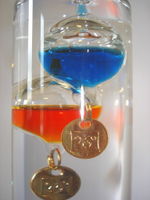Thermometers
A thermometer is a device that measures temperature or temperature gradient, using a variety of different principles. The word thermometer is derived from two smaller word fragments: thermo from the Greek for heat and meter also from Greek, meaning to measure. more...
A thermometer has two important elements, the temperature sensor (e.g. the bulb on a mercury thermometer) in which some physical change occurs with temperature, plus some means of converting this physical change into a value (e.g. the scale on a mercury thermometer). Industrial thermometers commonly use electronic means to provide a digital display or input to a computer.
Thermometers can be divided into two groups according to the level of knowledge about the physical basis of the underlying thermodynamic laws and quantities. For primary thermometers the measured property of matter is known so well that temperature can be calculated without any unknown quantities. Examples of these are thermometers based on the equation of state of a gas, on the velocity of sound in a gas, on the thermal noise (see Johnson–Nyquist noise) voltage or current of an electrical resistor, and on the angular anisotropy of gamma ray emission of certain radioactive nuclei in a magnetic field.
Secondary thermometers are most widely used because of their convenience. Also, they are often much more sensitive than primary ones. For secondary thermometers knowledge of the measured property is not sufficient to allow direct calculation of temperature. They have to be calibrated against a primary thermometer at least at one temperature or at a number of fixed temperatures. Such fixed points, for example, triple points and superconducting transitions, occur reproducibly at the same temperature.
Internationally agreed temperature scales are based on fixed points and interpolating thermometers. The most recent official temperature scale is the International Temperature Scale of 1990. It extends from 0.65 K to approximately 1358 K (−272.5 °C to 1085 °C).
Early history
Various authors have credited the invention of the thermometer to Abū Alī ibn Sīnā (usually known as Avicenna), Cornelius Drebbel, Robert Fludd, Galileo Galilei or Santorio Santorio. But the thermometer was not a single invention, it was a development.
Philo and Hero of Alexandria knew of the principle that certain substances, notably air, expand and contract and described a demonstration, in which a closed tube partially filled with air had its end in a container of water. The expansion and contraction of the air caused the position of the water/air interface to move along the tube.
Similar devices used to show the hotness and coldness of the air with a tube in which the water level is controlled by the expansion and contraction of the air, were developed by Avicenna in the early 11th century, and by several European scientists in the 16th and 17th centuries, notably Galileo Galilei. As a result, devices were shown to produce this effect reliably, and the term thermoscope was adopted because it reflected the changes in sensible heat (the concept of temperature was yet to arise). The difference between a thermoscope and a thermometer is that the latter has a scale. Though Galileo is often said to be the inventor of the thermometer, what he produced was a thermoscope.
Read more at Wikipedia.org


